MercoPress. South Atlantic News Agency
Tag: Argentina crisis
-
Tuesday, October 13th 2020 - 09:02 UTC
Argentina: massive protests with display of national flags against government policies
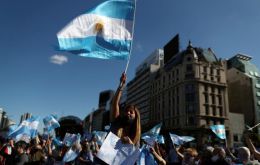
Thousands of Argentines flying the national colors on Monday took to the streets across the country's main cities to protest against the government of President Alberto Fernandez and his policies, which after over 200 days of quarantine/isolation have been unable to contain the pandemic, left the economy in shatters and threaten democratic institutions.
-
Tuesday, December 10th 2019 - 11:30 UTC
Peronism is back in Argentina: Alberto Fernández assumes as President

Peronism will return to power in Argentina from Tuesday. The political force will do it in the hands of the elected President, Alberto Fernández, who will go to the Casa Rosada, the presidential headquarters, at noon after presenting the oath in the Congress to the outgoing vice president, Gabriela Michetti
-
Friday, November 1st 2019 - 09:59 UTC
Argentina: official transition with incoming administration takes off next week
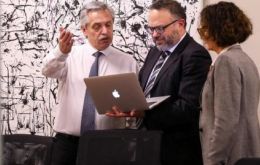
Argentina's official transition in anticipation of 10 December when elected president Alberto Fernandez takes office, is scheduled to begin next Wednesday when Fernandez returns from his first overseas trip to Mexico.
-
Friday, October 18th 2019 - 10:55 UTC
New IMF chief pledges full support for Argentina, but will wait for election results
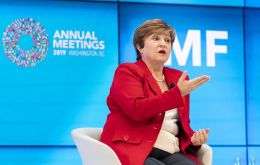
The International Monetary Fund will stand by Argentina as it works through its economic crisis, Managing Director Kristalina Georgieva said on Thursday. She added that the Fund was waiting to see the future policy framework adopted by Argentina, which holds an election later this month in which a change of government is widely predicted.
-
Thursday, October 17th 2019 - 09:54 UTC
September inflation in Argentina reaches 5.9% and 53.5% in twelve months

Argentina consumer prices rose 5.9% in September, the country’s statistics agency said on Wednesday, the sharpest jump in a year amid a flaring economic crisis in Latin America’s no. 3 economy. That brought year-to-date inflation to 37.7%, the National Institute of Statistics and Censuses (INDEC) said, while rolling 12-month inflation was running at 53.5%.
-
Saturday, October 12th 2019 - 09:50 UTC
“Argentina's financial downturn is a crisis of confidence in political institutions”
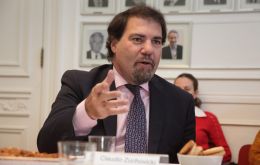
Argentina's financial crisis has been exacerbated by the political uncertainty facing the country with its president Mauricio Macri now most likely to be voted out of office at the national elections at the end of the month. However, according to Claudio Zuchovicki, the secretary-general of the Iberoamerican Stock Exchange Federation, the financial downturn is mostly a crisis of confidence in political institutions.
-
Tuesday, October 8th 2019 - 09:09 UTC
Weaker demand and Argentine situation hit hard Brazilian auto industry

Brazil’s auto industry trade group Anfavea has slashed its forecast for 2019 vehicle production growth to a modest 2.1% from 9% previously, it said on Monday. Anfavea had big plans this year for Brazil’s auto industry, which has been slowly recovering from a significant slump.
-
Friday, September 20th 2019 - 10:22 UTC
Argentine Central Bank will produce more Pesos: higher inflation is expected

According to estimates among analysts, the Argentine Peso's production will be around $ 300,000 million for the remainder of the year, estimating inflation for 2020 even higher than this year. 80% of that issuance corresponds to the last month of the year, breaking the objective that the Central Bank of Argentina (BCRA) of “zero-emission” had set and jeopardized the exchange control as it works since August.
-
Saturday, August 31st 2019 - 17:54 UTC
The “Amazon fires of uncertainty” in Argentina: can they get worse?

Argentina’s battered bonds were driven still lower on Friday after a credit rating cut from Standard & Poor’s triggered automatic selling mechanisms at big pension funds. Risk spreads blew out to levels not seen since 2005 while the local peso currency extended its year-to-date slide to 36%, forcing renewed central bank market intervention and intensifying worries about Argentina’s ability to honor its dollar-denominated debt.
-
Friday, July 26th 2019 - 09:59 UTC
Argentina's economy lifting out of recession: activity rises in May for the first time in a year
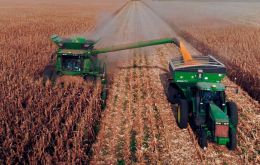
Argentina’s economic activity rose for the first time in over a year in May, a rare boost for President Mauricio Macri as he looks to dig the South American country out of a crippling recession ahead of presidential elections later this year.
